2-(4-BIPHENYLYL)-5-PHENYL-1,3,4-OXADIAZOLE
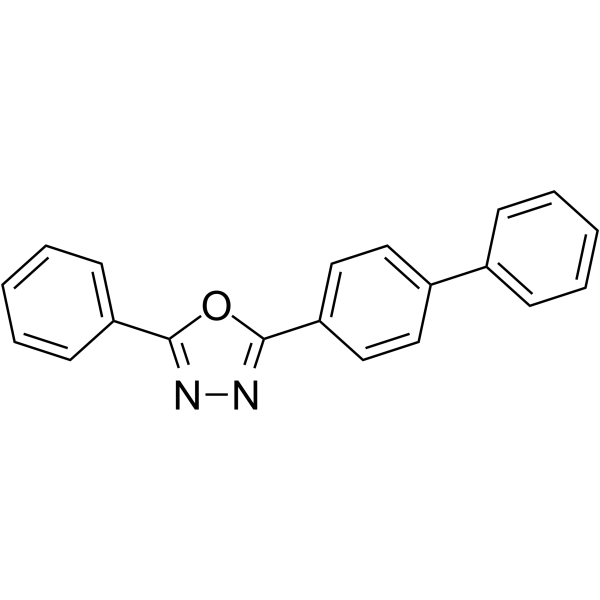
2-(4-BIPHENYLYL)-5-PHENYL-1,3,4-OXADIAZOLE structure
|
Common Name | 2-(4-BIPHENYLYL)-5-PHENYL-1,3,4-OXADIAZOLE | ||
|---|---|---|---|---|
| CAS Number | 852-38-0 | Molecular Weight | 298.33800 | |
| Density | 1.172g/cm3 | Boiling Point | 480.7ºC at 760 mmHg | |
| Molecular Formula | C20H14N2O | Melting Point | 167-169 °C(lit.) | |
| MSDS | Chinese USA | Flash Point | 240.7ºC | |
Use of 2-(4-BIPHENYLYL)-5-PHENYL-1,3,4-OXADIAZOLE2-(4-Biphenylyl)-5-phenyl-1,3,4-oxadiazole is a laser dyes with high photoluminescence (PL) quantum efficiency[1]. |
| Name | 2-(4-Biphenylyl)-5-phenyl-1,3,4-oxadiazole |
|---|---|
| Synonym | More Synonyms |
| Description | 2-(4-Biphenylyl)-5-phenyl-1,3,4-oxadiazole is a laser dyes with high photoluminescence (PL) quantum efficiency[1]. |
|---|---|
| Related Catalog | |
| References |
| Density | 1.172g/cm3 |
|---|---|
| Boiling Point | 480.7ºC at 760 mmHg |
| Melting Point | 167-169 °C(lit.) |
| Molecular Formula | C20H14N2O |
| Molecular Weight | 298.33800 |
| Flash Point | 240.7ºC |
| Exact Mass | 298.11100 |
| PSA | 38.92000 |
| LogP | 5.07060 |
| Index of Refraction | 1.612 |
| Storage condition | 2-8°C |
Synonym:1,3,4-Oxodiazole,2-1,1'-Biphenyl-4-yl-5-Pheny Section 2 - COMPOSITION, INFORMATION ON INGREDIENTS
Risk Phrases: None Listed. Section 3 - HAZARDS IDENTIFICATION EMERGENCY OVERVIEW
The toxicological properties of this material have not been fully investigated. Potential Health Effects Eye: May cause eye irritation. The toxicological properties of this material have not been fully investigated. Skin: May cause skin irritation. The toxicological properties of this material have not been fully investigated. Ingestion: May cause irritation of the digestive tract. The toxicological properties of this substance have not been fully investigated. Inhalation: May cause respiratory tract irritation. The toxicological properties of this substance have not been fully investigated. Chronic: No information found. Section 4 - FIRST AID MEASURES Eyes: Flush eyes with plenty of water for at least 15 minutes, occasionally lifting the upper and lower eyelids. Get medical aid. Skin: Get medical aid. Flush skin with plenty of water for at least 15 minutes while removing contaminated clothing and shoes. Wash clothing before reuse. Ingestion: Never give anything by mouth to an unconscious person. Get medical aid. Do NOT induce vomiting. If conscious and alert, rinse mouth and drink 2-4 cupfuls of milk or water. Inhalation: Remove from exposure and move to fresh air immediately. If not breathing, give artificial respiration. If breathing is difficult, give oxygen. Get medical aid. Notes to Physician: Section 5 - FIRE FIGHTING MEASURES General Information: As in any fire, wear a self-contained breathing apparatus in pressure-demand, MSHA/NIOSH (approved or equivalent), and full protective gear. During a fire, irritating and highly toxic gases may be generated by thermal decomposition or combustion. Extinguishing Media: Use agent most appropriate to extinguish fire. Use water spray, dry chemical, carbon dioxide, or appropriate foam. Section 6 - ACCIDENTAL RELEASE MEASURES General Information: Use proper personal protective equipment as indicated in Section 8. Spills/Leaks: Vacuum or sweep up material and place into a suitable disposal container. Clean up spills immediately, observing precautions in the Protective Equipment section. Avoid generating dusty conditions. Provide ventilation. Section 7 - HANDLING and STORAGE Handling: Wash thoroughly after handling. Remove contaminated clothing and wash before reuse. Use with adequate ventilation. Minimize dust generation and accumulation. Avoid contact with eyes, skin, and clothing. Keep container tightly closed. Avoid ingestion and inhalation. Storage: Store in a tightly closed container. Store in a cool, dry, well-ventilated area away from incompatible substances. Section 8 - EXPOSURE CONTROLS, PERSONAL PROTECTION Engineering Controls: Use adequate ventilation to keep airborne concentrations low. Exposure Limits CAS# 852-38-0: Personal Protective Equipment Eyes: Wear appropriate protective eyeglasses or chemical safety goggles as described by OSHA's eye and face protection regulations in 29 CFR 1910.133 or European Standard EN166. Skin: Wear appropriate protective gloves to prevent skin exposure. Clothing: Wear appropriate protective clothing to prevent skin exposure. Respirators: Follow the OSHA respirator regulations found in 29 CFR 1910.134 or European Standard EN 149. Use a NIOSH/MSHA or European Standard EN 149 approved respirator if exposure limits are exceeded or if irritation or other symptoms are experienced. Section 9 - PHYSICAL AND CHEMICAL PROPERTIES Physical State: Powder Color: white Odor: Not available. pH: Not available. Vapor Pressure: Not available. Viscosity: Not available. Boiling Point: Not available. Freezing/Melting Point: 168.00 - 170.00 deg C Autoignition Temperature: Not available. Flash Point: Not available. Explosion Limits, lower: Not available. Explosion Limits, upper: Not available. Decomposition Temperature: Solubility in water: Specific Gravity/Density: Molecular Formula: C20H14N2O Molecular Weight: 298.33 Section 10 - STABILITY AND REACTIVITY Chemical Stability: Stable under normal temperatures and pressures. Conditions to Avoid: Incompatible materials, dust generation, excess heat, strong oxidants. Incompatibilities with Other Materials: Oxidizing agents. Hazardous Decomposition Products: Carbon monoxide, oxides of nitrogen, irritating and toxic fumes and gases, carbon dioxide. Hazardous Polymerization: Has not been reported Section 11 - TOXICOLOGICAL INFORMATION RTECS#: CAS# 852-38-0 unlisted. LD50/LC50: Not available. Carcinogenicity: 1,3,4-Oxadiazole, 2-1,1'-Biphenyl-4-yl-5-Phenyl - Not listed by ACGIH, IARC, or NTP. Section 12 - ECOLOGICAL INFORMATION Section 13 - DISPOSAL CONSIDERATIONS Dispose of in a manner consistent with federal, state, and local regulations. Section 14 - TRANSPORT INFORMATION IATA Not regulated as a hazardous material. IMO Not regulated as a hazardous material. RID/ADR Not regulated as a hazardous material. Section 15 - REGULATORY INFORMATION European/International Regulations European Labeling in Accordance with EC Directives Hazard Symbols: Not available. Risk Phrases: Safety Phrases: S 24/25 Avoid contact with skin and eyes. S 28A After contact with skin, wash immediately with plenty of water. S 37 Wear suitable gloves. S 45 In case of accident or if you feel unwell, seek medical advice immediately (show the label where possible). WGK (Water Danger/Protection) CAS# 852-38-0: No information available. Canada CAS# 852-38-0 is listed on Canada's NDSL List. CAS# 852-38-0 is not listed on Canada's Ingredient Disclosure List. US FEDERAL TSCA CAS# 852-38-0 is listed on the TSCA inventory. SECTION 16 - ADDITIONAL INFORMATION N/A |
| Personal Protective Equipment | Eyeshields;Gloves;type N95 (US);type P1 (EN143) respirator filter |
|---|---|
| Hazard Codes | Xi |
| Safety Phrases | S22-S24/25 |
| RIDADR | NONH for all modes of transport |
| WGK Germany | 3 |
| HS Code | 2934999090 |
|
~85% 
2-(4-BIPHENYLYL... CAS#:852-38-0 |
| Literature: Majji, Ganesh; Rout, Saroj Kumar; Guin, Srimanta; Gogoi, Anupal; Patel, Bhisma K. RSC Advances, 2014 , vol. 4, # 11 p. 5357 - 5362 |
|
~82% 
2-(4-BIPHENYLYL... CAS#:852-38-0 |
| Literature: Wang, Ying; Sauer, Daryl R.; Djuric, Stevan W. Tetrahedron Letters, 2006 , vol. 47, # 1 p. 105 - 108 |
|
~66% 
2-(4-BIPHENYLYL... CAS#:852-38-0 |
| Literature: Milcent, Rene; Barbier, Geo Journal of Heterocyclic Chemistry, 1983 , vol. 20, p. 77 - 80 |
|
~% 
2-(4-BIPHENYLYL... CAS#:852-38-0 |
| Literature: Journal of the American Chemical Society, , vol. 77, p. 1850 |
|
~% 
2-(4-BIPHENYLYL... CAS#:852-38-0 |
| Literature: Journal of the American Chemical Society, , vol. 77, p. 1850 |
|
~% 
2-(4-BIPHENYLYL... CAS#:852-38-0 |
| Literature: Journal of the American Chemical Society, , vol. 77, p. 1850 |
|
~% 
2-(4-BIPHENYLYL... CAS#:852-38-0 |
| Literature: Tetrahedron, , vol. 62, # 43 p. 10223 - 10236 |
|
~% 
2-(4-BIPHENYLYL... CAS#:852-38-0 |
| Literature: Magnetic Resonance in Chemistry, , vol. 49, # 10 p. 648 - 654 |
|
~% 
2-(4-BIPHENYLYL... CAS#:852-38-0 |
| Literature: Magnetic Resonance in Chemistry, , vol. 49, # 10 p. 648 - 654 |
| Precursor 7 | |
|---|---|
| DownStream 4 | |
| HS Code | 2934999090 |
|---|---|
| Summary | 2934999090. other heterocyclic compounds. VAT:17.0%. Tax rebate rate:13.0%. . MFN tariff:6.5%. General tariff:20.0% |
|
Cytohesin 2/ARF6 regulates preadipocyte migration through the activation of ERK1/2.
Biochem. Pharmacol. 92(4) , 651-60, (2015) Preadipocyte migration is vital for the development of adipose tissue, which plays a crucial role in lipid metabolism. ADP-ribosylation factor 6 (ARF6) small GTPase, which regulates membrane trafficki... |
|
|
mTOR Directs Breast Morphogenesis through the PKC-alpha-Rac1 Signaling Axis.
PLoS Genet. 11 , e1005291, (2015) Akt phosphorylation is a major driver of cell survival, motility, and proliferation in development and disease, causing increased interest in upstream regulators of Akt like mTOR complex 2 (mTORC2). W... |
|
|
Suppression of chemotaxis by SSeCKS via scaffolding of phosphoinositol phosphates and the recruitment of the Cdc42 GEF, Frabin, to the leading edge.
PLoS ONE 9(10) , e111534, (2014) Chemotaxis is controlled by interactions between receptors, Rho-family GTPases, phosphatidylinositol 3-kinases, and cytoskeleton remodeling proteins. We investigated how the metastasis suppressor, SSe... |
| EINECS 212-712-0 |
| 2-phenyl-5-(4-phenylphenyl)-1,3,4-oxadiazole |
| MFCD00003100 |
![N'-([1,1'-biphenyl]-4-ylmethylene)benzohydrazide structure](https://www.chemsrc.com/caspic/126/412956-37-7.png)
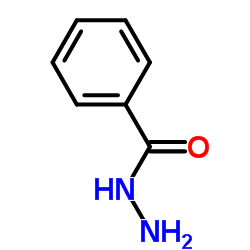
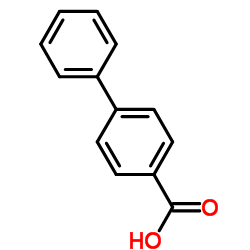
![N'-benzylidene-[1,1'-biphenyl]-4-carbohydrazide structure](https://www.chemsrc.com/caspic/268/86268-09-9.png)
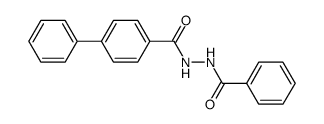
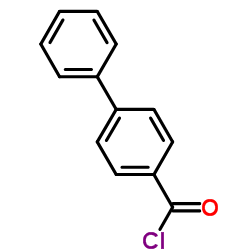


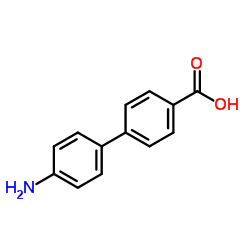 CAS#:5730-78-9
CAS#:5730-78-9 CAS#:5731-13-5
CAS#:5731-13-5 CAS#:114691-92-8
CAS#:114691-92-8
